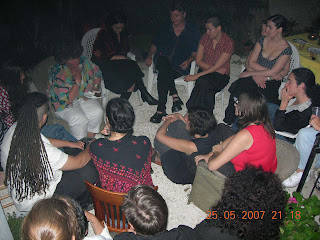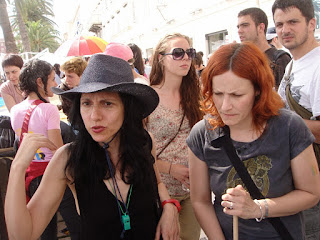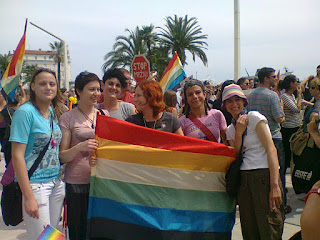Archives in Times of Need, in Times of Change
(Note: The talk was given in two parts, first about our time in Palestine/ Israel and then in Belgrade; images followed each section of text to bring the images of dissenting bodies live to this archival gathering space, the rooms of ALGA.)
I sit amidst gold, orange and deep blue--splendors from small things in a Melbourne back yard garden, the lobelia lining the fish pond, the clack of the resident wattle bird--sitting high in her native frangi-pani tree, her head thrown back, her body growing slimmer it seems by the moment as her crackle gives way to a series of knocks and them almost against her will, her own lyric emerges--as if the hard knocks had to come first and only after, came the song, perhaps when some kind of safety had been won.
I am sitting out of the sun to gather my thoughts about our archival projects--the queer archives--and I use "queer" as an all embracing word--a project which seems to take on new meanings, new importances with every decade of my life or even more, with every journey out of the safe confines of known territories into places of national and regional contestations. (The realization hits me that you define your archives as a national one--a thought to keep in mind if one defines the archives as a possible site of nationalistic co-options.)
A gentle wind, distant relative to the vast blows we have recently had, has just gentled the sun's sting, and I grow in my gratitude for the freely given vagaries of this moment.
Palestine/Israel, 2007
Since last I spoke to you, I have been an archives traveler to two places in the world where ultranationalisms make dissenters doubly queer: Israel and Belgrade. In 2007, I was asked to speak to queer and women's peace groups in Haifa, Tel Aviv and Jerusalem. I carried lesbian history, stories of queer touch, into occupied territories both within Israel and without. In my first formal meeting--with 50 women gathered in L'Isha L'Isha, the Haifa Women's Center, I met Rouda Marcos and the other women of ASWAT, the Palestinian lesbian association which meets at the center. At that center, always battling for the right to exist, for the funds to exist, Palestinian, Ethiopian, Jewish, Christian, Druid, non believers, young and old, straight and gay, work together for new visions. Here is one of the rare places in Israel where a dissenting community struggles to sustain itself as a voice of opposition to many of the Israeli government's social and political policies. The newest project, I was told the next day, was an archival joint project with the Palestinian women's center of Nazareth, documenting the role of women, straight and queer, in the peace struggles of the Middle East.
On the ASWAT t-shirt are the words:
"My Right/
To Live/
To Choose/
To Be"
When I said I would speak of archives in times of need, I did not mean financial or resource gathering needs. I meant the need for the archival presence, or eye, to be a living moment of the conscience of memory, to be present when nationalisms declare war on unwanted bodies or utterances or histories, to let the embattled know that another spirit of history is present, that it is seeing beyond the dictated hatreds of a nation's public discourse, to make sure that those who risk every thing by saying no to national brutalities will see their reflection again and again where ever other possibilities of more just human communities are discussed.
A Document From my Archives, written in 2008: "The conversation next continued in a classroom in Tel Aviv where I spoke about 'History, Passion and the Body' as part of a series of programs sponsored by Gay and Lesbian Studies, the Queer Theory Reading Group and the National Council of Jewish women's Studies Forum. It was here that I met a younger group of queer people, mostly women, part of the Israeli/Palestinian butch-fem community, many of whom had also been members of Black Laundry, a new generation's version of Women in Black. Because of my work the Lesbian Herstory Archives, I am a carrier of voices from what I call our survival time, and I shared some of those voices that afternoon, including the story of Jul Bruno, telling of her life as a young Italian working class butch in NYC in the late 1950s, speaking of her erotic adventures in the Greenwich Village bars, her run-ins with the police who would often arrest her as a nuisance and keep her handcuffed in such a way that she could neither sit or stand--and in a lighter but just as important, the story of the first time she uses a dildo. An older Israeli butch woman was in the audience, she knew my work, and said loudly that she did not not like my opening thank yous to the Women in Black members I had stood with in Haifa and Jerusalem. 'Why do you need to put politics into our story?' she said.
At the end of the two hours, a group of fem women came up to talk with me about the difficulties they faced, the judgements from all sides that accompanied their lives. As they spoke and I comforted, I saw their beauty.
That night we spent in the Jerusalem home of peace activist Gila S. and her partner Judy; the following day, we stood vigil against the occupation and then Gila took us through the streets of Jerusalem. At one point we crossed over the Green Line, going into the West Bank, and then we traveled along the Wall surrounding Bethlehem, stopping at a checkpoint controlling Palestinian entry and departure and finally we plunged into the frantic histories of the old city. A long hard day. In the evening, another communal sharing of food; many of the young people who had been present in Tel Aviv had made their way to Gila's house for the potluck. Feeling a little tired, I sat in a chair in the backyard taking in the scents of the warm night air, the night sounds of Jerusalem, and one by one, the students and their friends came to sit around me. They wanted stories of the body, wanted tales of how we survived the bigotries of the 1950s, how we found each other and tried to imagine another world. We leaned into each other and again I saw the beauty of the unarmed human body, their hopes for another kind of future held in bare arms. 'Come back to us,' one of the young women said, "when the occupation is over.'"
 |
| The Occupation, 1948-- |
 |
| Checkpoint at Crossing with Jordan, 2007 |
 |
| Member of ASWAT, in L'Isha L'Isha , the Haifa Women's Center |
 |
| The ASWAT Office in L'Isha L'Isha, Haifa, 2007 |
 |
| Words on ASWAT T-Shirt: "My Right/To Live/To Choose/To Be," 2007 |
 |
| Talking in Jerusalem with Butch-Fem Peace Activists from Black Laundry, 2007 |
 |
| The Fem Body in a Contested Land |
 |
| Archival Dreams: "Come Back to Us When the Occupation is Over" |
 |
| Gila, Lesbian Peace Activist at the Wall, 2007 |
In April of this year, thanks to the efforts of Lepa Mladjenovic and so many others, Di and had the opportunity to meet with lesbians, queer people, feminists who had traveled from Croatia, Montenegro, Slovenia, Bosnia and Herzegovina and Macedonia to Belgrade. Once again, I carried stories and images from LHA into a conflicted place, but even more importantly, we heard their stories and touched their bodies of resistance.
From my archival documents: Belgrade, 2011
Times are tense now on the streets of Belgrade as the chosen time for the Gay Pride march grows near. Armed conflict at the Kosovo-Serbian border has inflamed nationalist angers. Lepa as always tells me of the messages that fly across the country.
September 28, 2011: "'From the Independent Police Syndicate Trade Union: We invite members of the Organization Committee of Belgrade Pride to postpone this year's demonstration because certain groups are preparing not only attacks, but as well are promising a demolishing under the title, 'Belgrade on Fire.' According to our knowledge, hooligans are planning--in all suburban communities in Belgrade as well as in bigger towns is Serbia--to destroy and burn on Pride Day.'" She writes later in the day, "I have received a letter from T. this morning about several small attacks on lesbians and gays in Vojvodina. It is obvious that these kind of statements like the one from the Police Trade Union has given the green light to gangs of young men to walk around town and threaten different looking people in the search for excitement, especially in the evening and night. The fear is obviously present."
I think of the women we have met, of their work, in the region, in small and larger towns, and my worry grows.
On September 29th, 8:36 AM, Lepa writes, "The fear has been extended in the lesbian and gay community, I can't tell you how much...I am observing that threatening will have its effects because the police do not have political backing, not one political party has openly supported the police! so why should they send 5000 policemen to be hit and beaten by ultra-nationalists men to protect the lesbians and gays who are the ones supposed to be beaten, if they don't get anything in return? No extra salary, no political points. So we are talking today and we expect more and more the police will say no. We shall see. And second is this issue of Kosovo and they see it as a shame to involve the State and the police in Faggots' issues while Serbia is already burning on the border of Kosovo! OK. Enough"
On the same day, 9:59AM, Lepa writes: " More attacks in Novi Sad, T. is non stop active there. Lesbians from Novi Sad decide not to come to Belgrade Pride. All night they met to discuss this. Too much pain. We need to see what we can do. One ultra fascist organization had announced at a press conference last month, they would actively work to stop the realization of Gay Pride Belgrade 2011. They are active nonstop. I think they are behind the police statement. Every day the town sees new fascist posters that we take down during the rest of the day..."
Monday, September 19, 2011
From Lepa, "The latest news here is that in one small town in Serbian, Jagodina, where the mayor is drastically homophobic explicitly against Pride, saying, "We don't have these people in our town," this graffiti has appeared, in English! The Lesbians of Jagodina Strike Back!"
On October 1, Lepa writes me that the State has banned Gay Pride Belgrade 2011. The community feels a mixture of relief, anger, sadness and resolve. Already endless meetings, plans for action are taking place in Belgrade. This is how I want to end this entry, with the images of hope and the refusal to hide, with an image of gay people from the region picnicking in the Belgrade park, sitting on a rainbow flag that offers its defiant message while giving comfort and the parting image from our last night in Belgrade, where young lesbians laughed and celebrated their freedom in the night air. That bar, so wonderfully perched on a street corner, in the old Jewish neighborhood, near where Lepa lives, is gone now--the economics were too hard--but this is the wonder of it all, the persistence of resistance in the face of national hatreds.
What is happening here is of the greatest importance, it seems to me, for it is here that ultra nationalisms and a homophobia are emblazoned on the walls, it is here, at these deeply contested national spaces where the threat of violence is so real, that gay liberation takes on its deepest meanings in our times. It is here where the State and the Queer Body stand in the clearest opposition--not the here of Serbia only, but the here of so many countries where we are marked as bringers of shame to the national narrative of power and cultural purity. I think of American where the problem seems different. There wealthy gay men rush into the arms of the Republican party to pay them back for supporting gay marriage, for unquestioning support of the nationalism of Israel, where we thank the State for letting us once again be good soldiers, this time without secrets, this time openly queer participants in the mass murders known as War. The State and the Queen Body, the Border and the Queer Body, the Policing of Others and the Queer Body, Nationalisms and the Queer Body. Oh my young thinkers, you have much to ponder, while the people are in the streets.
Belgrade, Croatia, 2011
 |
| Ultra Nationalist Graffiti, Belgrade, 2011 |
 |
| Gay Demonstration, Belgrade, 2011 |
 |
| Gay Pride March, Split, Croatia, 2011 |
 |
| Nela and friends, voices of Lesbian Defiance, Croatia, 2011 |
 |
| Lepa Speaking at Split Gay Pride, 2011 |
 |
| Listening to Each Other's History at the Rex, with Nina, the translator |
 |
| Lesbian Joy: Our Last Night in Belgrade at a Lesbian Bar, Closes a Month Later, 2011 |
 |
| The Birth of a Gay Ritual, Belgrade, 2011 |
 |
| Lesbian Graffiti, Jagodina, Serbia, 2011 Support Demonstration in Budapest, 2011 |
 |
| Always, these are our bodies, sometimes tired with the need for vigilance aganst homophobia and killing nationalisms but still in the streets. |
Now just a few words about the second theme of tonight, archives in times of change. When Daniel asked me to speak tonight--something I am doing less of--I had two pressing thoughts. The first, the need for the queer archival eye as a living present in social change struggles, as living promise of the comradeship of memory. I am thinking now about who is documenting the queer presence in the Occupy Melbourne movement. The other, as so clearly faces me in the mirror every day, the changing of generations in our archival movement. The first generation of queer archives dreamers and doers are now archives materials themselves. We have always spoken of the archives as places of intergenerational conversation; now comes the challenge of intergenerational handovers. The archives movement as we have known it grew out of the social surges of the 60s and got on its feet in the 1970s, that is over 40 years ago. I suspect all kinds of changes to the archival project are in the wings, technology just for starters. Just last week I watched an archives come into being over night--on face book when Susie Bright launched a quest for "On Our Backs" contributors, and there it all came into the light once again. So quickly, so far reaching. And I farsee a growing conversation about nationalisms and our archives. What kind of dreaming awaits as concepts of gender reshape themselves, what does the future hold in the relationship between queerness and prevailing economic structures, in the collapse or in the tyrannies of capitalistic excess. I will not go on--but even though this was a two themed talk--need and change--I see the connection between these two subjects. In our archival work, in whose ever hands it falls, this voice from the early time, says to you always remember the tenderness of the exiled body, the wonder of queer people of all sorts taking to the streets that do not want them and the need to tell the story of how the journey continues. Thank you for listening so patiently to this American voice.









No comments:
Post a Comment